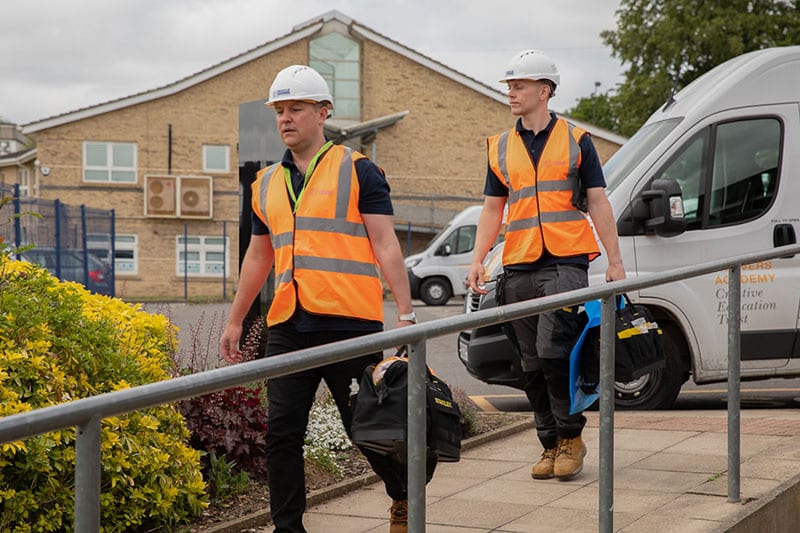Asbestos surveyor job vs asbestos consultant job: understanding the differences
What should not be in any doubt in the 2020s, is the considerable importance of practising safe and effective asbestos management. In the space of a generation or so, the UK has gone from asbestos being legal to import and use (until 1999), to one in which stringent regulations govern how the substance is managed on any given premises.
Today, if you are classed as a dutyholder for a non-domestic building under the Control of Asbestos Regulations 2012 (CAR 2012), you must comply with certain responsibilities. Those responsibilities include – but are not limited to – taking reasonable steps to determine whether asbestos is present in the building in the first place, and maintaining a record of the location and condition of any such asbestos-containing materials (ACMs).
So, in your position as a dutyholder, you are likely to benefit at certain points in time from the expertise and assistance of both asbestos surveyors and asbestos consultants.
However, it is also true that an asbestos surveyor is not exactly the same thing as an asbestos consultant; they are distinct roles. With this in mind, we decided to take a closer look at what distinguishes these two jobs.
What does the job of an asbestos surveyor involve?
An asbestos surveyor can be defined as someone whose role it is to inspect buildings, with an aim of collecting samples in order to determine whether asbestos is present on the given site – and if so, what location and amount of asbestos is present.
Professionals who carry out asbestos surveying therefore play a vital role in helping dutyholders to comply with their obligations in accordance with CAR 2012.
Below are some of the other key details to know about asbestos surveyors:
Responsibilities
As aforementioned, an asbestos surveyor’s responsibilities include conducting surveys as a means of identifying and assessing ACMs. A person in this role also typically takes samples of materials on the given site, and sends them to a laboratory for analysis, in order to ascertain whether asbestos is present in the sampled material.
Asbestos surveyors also carry out risk assessment, and compile reports on the condition of ACMs in buildings. This information allows dutyholders to make informed decisions on how to manage asbestos on their sites – including whether to manage the material in place, or instead have it removed altogether from the premises.
Focus on fieldwork
A major distinction between asbestos surveyors and asbestos consultants, is that the surveyor’s work very much takes place “in the field” – in other words, the specific sites where asbestos is suspected to be present.
An asbestos surveyor, then, typically carries out comprehensive inspections of buildings and premises, aimed at identifying and documenting the location, type, and condition of ACMs.
Compliance and risk mitigation
Something else that an asbestos surveyor is required to do, is ensure compliance with all relevant asbestos regulations and guidelines. Such regulatory compliance is not only vital for the purposes of avoiding legal consequences; it is also of central importance for minimising the risk of everyday users of the given premises coming into contact with asbestos.
As part of this, the asbestos surveyor will also typically provide recommendations to the dutyholder on what steps they can take to manage or remove any ACMs that are found on the site.
What does the job of an asbestos consultant involve?
While the primary responsibility of an asbestos surveyor is to carry out asbestos surveys in given buildings and premises, the emphasis of an asbestos consultant’s role is on offering broader expertise and guidance on asbestos management.
There are, then, certainly potential areas of overlap between the role of an asbestos surveyor, and that of an asbestos consultant, as both types of asbestos professional will typically provide invaluable advice and guidance to dutyholders.
Indeed, asbestos consultants also sometimes work closely with asbestos surveyors. However, asbestos consultants are usually involved in the more strategic aspects of asbestos management and regulatory compliance.
Below, we have outlined some of the other specific things that make an asbestos consultant’s role distinctive:
Responsibilities
An asbestos consultant tends to have broader expertise in asbestos management and regulations than an asbestos surveyor, and provides dutyholders with strategic guidance and consulting services.
Compliance and policy development
Asbestos consultancy services usually include advising and assisting dutyholders in relation to the development of asbestos management plans, policies, and procedures.
The asbestos consultant helps their client to understand their legal obligations, as well as to assess the risk that ACMs might present on their site. This, in turn, helps the dutyholder to develop appropriate management policies.
Risk assessment and management
As a dutyholder, you might engage the services of an asbestos consultant, so that they can help you to assess the nature and extent of the risks that ACMs are likely to pose on your premises.
The asbestos consultant that you work with, then, may play a key role in your efforts to develop appropriate asbestos management strategies.
Your asbestos consultant might even go as far as overseeing the implementation of asbestos-related projects, such as removal or remediation. This, in turn, could help you to ensure your compliance with asbestos regulations and industry best practices.
Training and education
Something else that an asbestos consultant might do, is provide their clients with training programmes to help raise awareness of asbestos, and to improve knowledge of how to safely and effectively manage the potentially very dangerous substance.
An asbestos consultant, then, can greatly contribute to the education of clients and stakeholders on asbestos hazards, and the best ways of managing those hazards.
Key differences between asbestos surveyors and asbestos consultants
The below, then, can be seen as some of the major distinctions between these two important roles:
Scope and focus
While asbestos surveyors are primarily focused on fieldwork and on the identification of ACMs on a given site, asbestos consultants provide their clients with the benefit of broader expertise in asbestos management and the associated regulations.
Strategic vs operational
An asbestos surveyor is primarily involved in carrying out on-site inspections and assessments. Consultants, on the other hand, are known for the strategic guidance, knowhow in policy development, and oversight that they provide to their clients.
Compliance and regulations
This is an important area of concern for both asbestos surveyors and asbestos consultants. Surveyors, after all, need to ensure compliance with asbestos regulations during surveys. Meanwhile, asbestos consultants help their clients to understand and comply with asbestos regulations.
Risk assessment and management
With regard to the assessment and management of asbestos risks, asbestos surveyors are diligent in assessing the risk of ACMs releasing dangerous asbestos fibres. For consultants, the emphasis will be on providing their clients with comprehensive risk assessment and management strategies.
Collaboration and synergy
As we touched on above, asbestos surveyors and asbestos consultants do not necessarily exist entirely apart from each other. They do sometimes work closely with each other, albeit with the asbestos consultant tending to place greater emphasis on the strategic sides of asbestos management and compliance with the regulations.
Still, by working together, asbestos consultants and asbestos surveyors can further help ensure dutyholders are managing confirmed or suspected asbestos on their sites in safe and effective ways.
Conclusion: two different, but complementary roles in asbestos management
Hopefully, by now we will have helped to give you a strong sense of where asbestos surveyors and asbestos consultants vary from each other, as well as the potential areas where their duties and expertise might overlap.
In summary, while the principal focus of asbestos surveyors is on the identification and assessment of ACMs, asbestos consultants provide broader consulting services in relation to asbestos management, compliance, and strategic guidance.
Asbestos consultants go beyond the scope of an asbestos surveyor’s typical responsibilities, in that they lend their expertise to the all-important processes of developing and implementing asbestos management plans and ensuring regulatory compliance.
It is also crucial, however, to acknowledge the complementary nature of these two roles, when it comes to achieving genuinely comprehensive asbestos management.
Asbestos surveyors and asbestos consultants share an overarching goal of protecting the health and safety of individuals, and the broader community, from asbestos hazards. So, when you are looking to ensure the most responsible management of possible asbestos on your own premises, you should not be thinking of surveyors and consultants as direct “alternatives” to each other.
Whether you are in need of asbestos surveying, asbestos consultancy, or both at any given time, the team at Oracle Solutions can help. Please feel free to send us an email or to give us a call today, so that we can give you the benefit of a fast, free, and competitive asbestos quote.

Written by Mark Carter
Mark Carter is a renowned expert in asbestos management, offering clients vital guidance on compliance and safety. His expertise is invaluable for navigating asbestos regulations, ensuring both safety and legal adherence. Mark's role is central in providing effective asbestos-related solutions, helping clients achieve their business objectives with an emphasis on regulatory compliance and safety in asbestos management.

